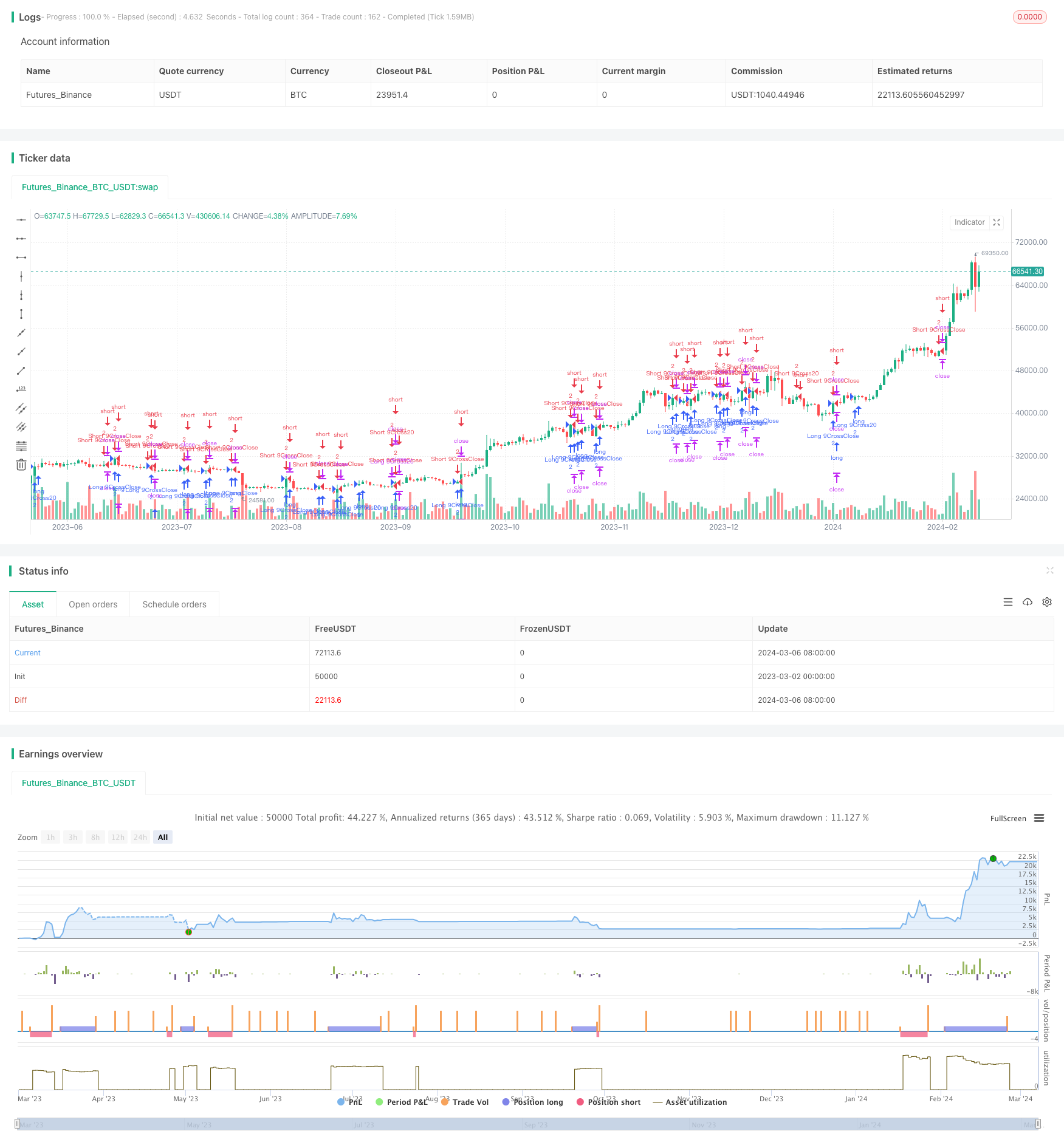双均线交叉策略-EMA9/20
Author: ChaoZhang, Date: 2024-03-08 15:22:50Tags:

策略概述
双均线交叉策略-EMA9/20是一个基于两条指数移动平均线(EMA)交叉的量化交易策略。该策略使用9日EMA和20日EMA作为交易信号,在两条均线交叉时产生买入或卖出信号。同时,该策略还使用了价格与9日EMA的交叉作为辅助信号,以及移动止损来管理交易风险。
策略原理
该策略的核心原理是利用两条不同周期的指数移动平均线的交叉来捕捉市场趋势。当短期均线(9日EMA)上穿长期均线(20日EMA)时,表明市场可能进入上升趋势,此时策略会产生买入信号;反之,当短期均线下穿长期均线时,表明市场可能进入下降趋势,此时策略会产生卖出信号。
除了均线交叉信号外,该策略还引入了价格与短期均线(9日EMA)的交叉作为辅助信号。当价格上穿9日EMA时,也会产生买入信号;当价格下穿9日EMA时,也会产生卖出信号。这样可以更及时地捕捉市场趋势的变化。
为了控制风险,该策略使用了移动止损(Trailing Stop)的方法。一旦交易进入盈利状态,移动止损会随着价格的变化而不断调整止损位置,直到价格反向突破止损位置,从而将盈利锁定,同时限制潜在损失。
策略优势
简单易懂:该策略基于经典的均线交叉原理,逻辑清晰,易于理解和实现。
趋势跟踪:通过两条不同周期的均线交叉,该策略可以有效捕捉市场的主要趋势。
及时止损:引入移动止损机制,可以在趋势反转时及时平仓,控制下行风险。
参数灵活:该策略的参数(如均线周期、止损点数等)可以根据不同市场和品种进行优化和调整,以适应不同的市场环境。
策略风险
频繁交易:由于该策略同时使用了均线交叉和价格交叉两种信号,可能会导致交易频率较高,从而增加交易成本。
震荡市:在市场震荡或者盘整时,该策略可能会产生较多的错误信号,导致盈利水平降低。
参数敏感:该策略的表现可能对参数选择较为敏感,不同参数可能带来截然不同的结果。
优化方向
信号过滤:在均线交叉和价格交叉信号的基础上,引入其他技术指标(如RSI、MACD等)作为过滤条件,以减少错误信号。
动态参数:根据市场波动率、趋势强度等因素,动态调整策略参数(如均线周期、止损点数等),以适应不同的市场状态。
仓位管理:根据市场趋势和信号强度,动态调整仓位大小,在趋势强度大时加大仓位,在趋势不明朗或信号较弱时减小仓位。
多品种适配:将该策略扩展到多个品种和市场,通过分散投资和相关性分析,降低整体风险,提高收益稳定性。
总结
双均线交叉策略-EMA9/20是一个简单实用的量化交易策略,通过两条不同周期均线的交叉和价格交叉来捕捉市场趋势,同时使用移动止损来控制风险。该策略逻辑清晰,易于理解和实现,适合初学者学习和使用。然而,该策略也存在一些局限性,如在震荡市中表现较差,对参数选择较为敏感等。因此,在实际应用中,需要根据具体市场和品种特点,对策略进行优化和改进,如引入信号过滤、动态参数调整、仓位管理等方法,以提高策略的盈利水平和稳定性。总的来说,双均线交叉策略-EMA9/20为量化交易提供了一个很好的基础框架,值得进一步研究和探索。
/*backtest
start: 2023-03-02 00:00:00
end: 2024-03-07 00:00:00
period: 1d
basePeriod: 1h
exchanges: [{"eid":"Futures_Binance","currency":"BTC_USDT"}]
*/
//@version=5
strategy(title = "EMAs 9 / 20",
shorttitle = '9/20 EMAs',
initial_capital = 1000,
overlay = true,
default_qty_type = strategy.fixed,
commission_type = strategy.commission.cash_per_contract,
commission_value = 0.35,
default_qty_value = 1)
int trailOffset = 10
int trailPoints = 15
series float oEma9 = ta.ema(ohlc4, 9)
series float oEma20 = ta.ema(ohlc4, 20)
series bool closeCrossoverEma9 = ta.crossover(close, oEma9)
series bool closeCrossunderEma9 = ta.crossover(close, oEma9)
series bool nineCrossover20 = ta.crossover(oEma9, oEma20)
series bool nineCrossunder20 = ta.crossunder(oEma9, oEma20)
//Entry Exits
if nineCrossover20
strategy.entry("Long 9Cross20", strategy.long, 2)
else if closeCrossoverEma9
strategy.entry("Long 9CrossClose", strategy.long, 2)
strategy.exit("Long 9CrossClose Exit", from_entry = "Long 9CrossClose", trail_points = trailPoints, trail_offset = trailOffset)
else if nineCrossunder20
strategy.close("Long 9Cross20")
if nineCrossunder20
strategy.entry("Short 9Cross20", strategy.short, 2)
else if closeCrossunderEma9
strategy.entry("Short 9CrossClose", strategy.short, 2)
strategy.exit("Short 9CrossClose Exit", from_entry = "Short 9CrossClose", trail_points = trailPoints, trail_offset = trailOffset)
else if nineCrossover20
strategy.close("Short 9Cross20")
- 抛物线SAR趋势跟踪策略 6.0
- 布林带与随机指标KD交叉策略
- 基于随机RSI和EMA交叉的加密货币回调交易策略
- 基于VWAP和OBV RSI指标的BabyShark交易策略
- 比特币动量跟踪止损策略
- 基于多阶段布林带和MACD指标的量化交易策略
- MACD均线多头量化交易策略
- 甲易炳量化趋势动量交易策略
- 基于移动平均线的突破交易策略
- 波林格带突破与波动率过滤策略
- 动态自适应趋势交易策略
- 基于随机指标交叉的双向止盈止损策略
- 基于相对强弱指数(RSI)与止损的多头量化交易策略
- 1-2-3 形态与 EMA、MACD 和第四根蜡烛线延伸的量化交易策略
- 基于21日EMA、成交量和RSI的趋势动量策略
- 基于双均线交叉和止损策略的高效交易策略
- 基于布林带均值回归策略
- 最高最低价格止损策略
- 基于RSI指标的双向交易策略
- SSL通道与绿量策略